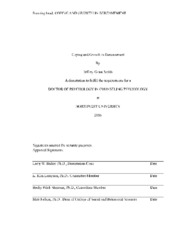Coping and Growth in Bereavement
Abstract
This study included an examination of the relationship between coping and growth in a mixed population of bereaved individuals. Coping was operationalized as the dual process model of coping with bereavement (DPM). Growth was operationalized as posttraumatic growth (PTG). Participants (n = 154) completed a modified version of the Inventory of Daily Widowed Life (IDWL-M) and the Posttraumatic Growth Inventory (PTGI) and provided demographic information. The relationship between the IDWL-M Oscillation Scores (Raw and Absolute-Value) and the PTGI Total Score and Factor Scores (1-5) were examined by linear and multiple linear regression analyses. Between samples t-tests were used to examine differences in PTG for nature of loss (expected and unexpected) and gender. First, no relationship was found to exist between equality in Loss- and Restoration-Orientation coping using the Absolute-Value Oscillation Score and PTG Total and Factor Scores. Second, a statistically-significant negative relationship was found to exist between the IDWL-M Raw Oscillation Score and PTGI Factor 2 (New Possibilities). Third, individuals with an unexpected loss were found to experience significantly more growth than those with an expected loss. These findings suggest that a increased focus on the issues directly associated with the loss is related to an increased growth in the area of New Possibilities. Also, these results suggest that individuals with a sudden loss experience more growth than do those who are able to anticipate the loss. Posttraumatic growth was shown to be prevalent among these participants.
Original item type
PDF
Original extent
ix, 117 pages
Collections
Copyright
This original work is protected by copyright. Copyright is retained by the author(s). Works may be viewed, downloaded, or printed, but not reproduced or distributed without author(s) permission.


 Maintained by the Northwest University Library
Maintained by the Northwest University Library